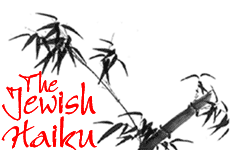 An Open Letter from Jewish Students at Columbia
An Open Letter from Jewish Students at Columbia


5 min read
A creative writing class unexpectedly unlocks metaphysical mysteries.
Recently my wife and I began taking a creative writing class together at the local community college. We have three young wonderful children, thank God, but sometimes we need a little adult time away. This class was nothing I took seriously; it was just a pleasant diversion to share with my wife.
In the class I planned to write some innocuous poems, and not wanting my every word to somehow be mistaken for "Jewish wisdom," I always had a baseball hat on over my yarmulke.
But behind the scenes, Someone else had plans to take that baseball hat off.
One particular night the class was learning about the haiku, a type of short poem originating in Japan. There are several specific and essential qualities that make a poem a haiku. The structure consists of 3 lines, with a 5-7-5-syllable pattern. I had seen haikus before, usually in a humorous context, such as in David Bader's "Haikus for Jews":
Would-be convert lost --
thawed Lender's Bagels made a
bad first impression.
Monarch butterfly, I know your name used to be Caterpillarstein.
While, these poems are funny, and follow the 5-7-5 pattern, that night in class we learned the other qualities needed to make a real haiku.
Haikus have to express something about nature. They have to use very concrete terms, never generalities. They have to deal with the here and now and be composed of strong nouns and verbs; rarely are there modifiers, such as adjectives or adverbs. Often their three lines are split into two parts, by a colon or a dash, with an imaginative distance between the two sections. Each line, however, should contain a complete thought. And finally, the whole haiku should have a twist that offers some spiritual insight by juxtaposition.
Clearly these poems aren't just rattled off by counting 5-7-5 on your fingers!
MOMENT OF REVELATION
That night, driving home from class, I noticed the darkness in the sky and the few stars out. I started thinking about the Shema -- the most important Jewish prayer, the Jewish "pledge of allegiance," which testifies to our belief in One God.
Some neurons thinking about class, and some neurons thinking about the Shema, must have greeted each other, because my heart started racing and my fingers went up in the air to count the syllables:
| She-ma Yis-ra-el | Hear O Israel |
| A-do-nay El-o-hei-nu | The Lord our God |
| A-do-nay E-chad | The Lord is One |
I gulped hard. 5-7-5 in the original Hebrew! I counted it in my head a few more times to make sure.
I gulped hard. 5-7-5 in the original Hebrew!
At times like these, when certain mundane things click together and form a Divine experience, I often think of the words Ani Yosef -- "I am Joseph." In the Torah, Joseph uttered these two words upon reuniting with his brothers (Genesis ch. 45). They finally understood that the prime minister of Egypt was none other than their long-lost brother. All their confusion and doubt vanished, and God's plan became clear.
In other words, I knew my baseball hat was coming off.
SIMPLICITY AND TWISTS
The more I thought about the Shema as a haiku, the more I was amazed at how it jumps through the definitional hoops. It has the 5-7-5 syllable pattern. It is about nature, or rather the nature of the universe. It is very concrete, and consists of strong nouns and a strong verb, with no modifiers. It deals with the here and now. Its three lines each express a complete thought. There is an imaginative distance between two distinct sections: The first section (Israel) is finite, and yet connects with the second section, God the Infinite.
Finally, the Shema's six simple words has many twists, offering spiritual insights by juxtaposition. Here are three:
- Elo-him, the God of Monotheistic Judaism, is a plural noun, signifying the seemingly many forces that are spread throughout creation. Yet, these worldly forces are One.
- "Ado-nay is our God" – the God of the Jews; but in the future, Ado-nay will be acknowledged by all as the One God.
- Ado-nay is used to denote God's Attribute of Mercy, while Elo-him is used to denote God's Attribute of Justice. But, no matter whether we perceive God as kind, angry, merciful, or judging, He is One, and His Truth and Purpose is One.
PROFOUNDLY ZEN-LIKE?
So there it was: The Jewish Haiku, the ultimate Jewish Poem. No jokes about bagels or gefilte fish. Here were all the key issues: who are we, who is God, what should we be doing.
I proudly submitted the Shema for my haiku homework, giving the Almighty full writing credit.
I told some friends about my discovery, and it reached one woman who's into Japanese poetry, not "Old World" Judaism. Framing the Shema as a haiku made it modern, "Zen"-like, poetic, and deep. She said it affected her more profoundly then anything else she'd encountered in Judaism.
Indeed, Judaism is not Old World. It is timeless, applicable, and relevant at every moment.
I proudly submitted the Shema for my haiku homework, giving the Almighty full writing credit.
The baseball hat came off.
Was this the real reason I was taking the creative writing class? Ani Yosef?
